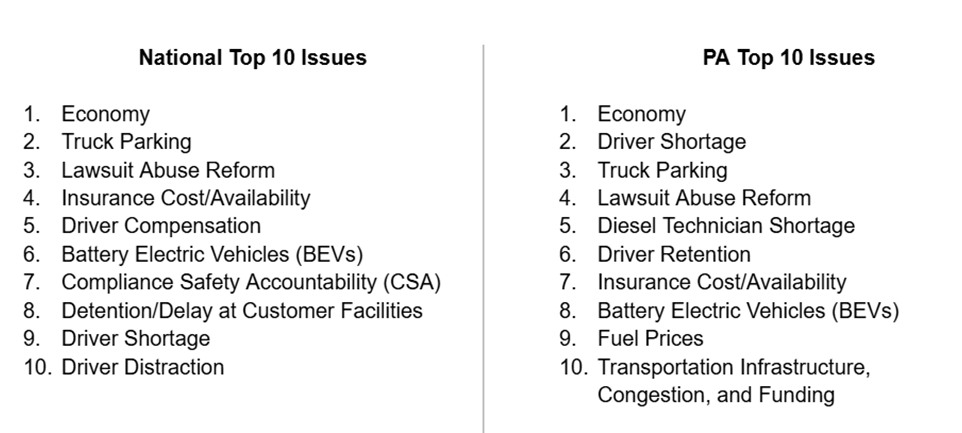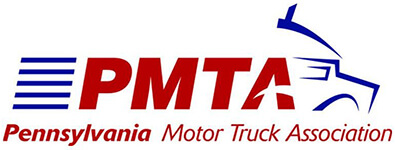ATRI Lists Trucking Industry's Top Issues
ATRI's national list compared to Pennsylvania truckers' concerns
On October 12, the American Transportation Research Institute (ATRI) released its Top 10 Industry Concerns List for 2024. ATRI found that the number one issue for the trucking industry nationwide is the economy, for the second year in a row. Among Pennsylvanian survey respondents, the economy also topped the list, overtaking truck parking as the state’s leading concern.
Here are the top ten issues nationally, as well the top ten among Pennsylvanians:

While the economy, truck parking, and lawsuit abuse reform are among the top five issues both state and nationwide, Pennsylvanians are far more concerned with driver shortage than the rest of the country. Issues facing the PA industry that did not rank nationally include diesel technician shortage, driver retention, and fuel prices.
When a state submits over 40 survey responses, ATRI will develop a report for that individual state, containing suggestions to address its top ten issues. This report is included below:
State Top Industry Issues Report 2024 Pennsylvania
- Economy
• Identify and promote reforming/repealing ineffective and burdensome regulations that increase industry costs without providing benefits.
• Push for renewing the 2017 Federal income and corporate tax cuts that are set to expire in 2025.
• Advocate for reshoring and near-shoring of truck equipment and parts manufacturing to reduce the reliance on international supply chains.
- Driver Shortage
• Advocate for expanding interstate CDL eligibility to 18-20-year old drivers.
• Examine potential new pathways into truck driving careers for under-represented populations including military veterans, inner city youth, young adults aging out of foster care, and formerly incarcerated individuals, among others.
• Support an industry-funded outreach program to improve the trucking industry’s image.
- Truck Parking
• Advocate for a dedicated federal funding program to increase truck parking capacity at freight-critical locations.
• Encourage local and regional governments to reduce the regulatory burdens limiting the construction and expansion of truck parking facilities.
• Support state DOT applications for U.S. DOT grants to expand truck parking.
- Lawsuit Abuse Reform
• Promote state-level reform to cap damages paid to plaintiffs in truck-involved crashes.
• Quantify the impact of third-party litigation funding on trial outcomes.
• Advocate for elimination of “phantom” medical damages.
- Diesel Technician Shortage
• Encourage partnerships between motor carriers, truck dealers, high schools and local community colleges/tech schools to promote diesel technician training and placement.
• Identify new training and curriculum needs relating to electric and/or autonomous truck maintenance.
- Driver Retention
• Quantify and promote the retention strategies of carriers that continuously experience low driver turnover.
• Research the primary factors behind drivers leaving trucking careers.
• Evaluate the impact of truck driver benefits, including health insurance and retirement benefits, on driver retention.
- Insurance Cost / Availability
• Develop framework for potential upfront insurance premium reductions when drivers and carriers adopt proven safety technologies.
• Educate the public on the role of lawsuit abuse in increasing consumer prices and insurance costs.
- Battery Electric Vehicles
• Quantify the charging infrastructure availability and/or requirements and subsequent supply chain costs of battery electric truck mandates.
• Assess the potential of a Federal Excise Tax (FET) repeal for encouraging fleet investment in newer, more energy-efficient equipment.
• Research the impacts of battery electric vehicles on transportation infrastructure, crash response and first responder safety.
- Fuel Prices
• Advocate for federal policies and actions that help stabilize the supply of fuel and minimize price increases.
• Quantify the impact of alternative and renewable fuel sources on motor carrier operational costs.
• Research potential factors that may be affecting fuel availability and pricing volatility.
- Transportation Infrastructure / Congestion / Funding
• Advocate for a new funding program to focus federal resources on truck bottlenecks along major freight corridors.
• Develop national guidance for a potential mileage-based user fee system to ensure that collection costs are minimized, policies are consistent between states, and rates do not discriminate against trucking operations.
